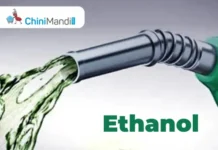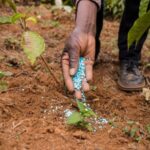With the recent hike in the Fair and Remunerative Price (FRP) of sugarcane, the sugar industry in India is urging the government to revise the Minimum Selling Price (MSP) of sugar as well as ethanol prices.
In June 2018, the Indian government set the MSP of sugar for the first time at Rs 29 per kg, when the FRP for sugarcane was Rs 2,550 per tonne. Since then, while the FRP has steadily increased, rising to Rs 3,550 per tonne for the 2025–26 season, the MSP of sugar has remained unchanged at Rs 31 per kg since February 2019.
In an exclusive interview with ChiniMandi, Tarun Sawhney, Vice Chairman and Managing Director of Triveni Engineering & Industries Ltd, highlights the urgent need to revise the sugar MSP and discusses key issues facing the sugar industry, as well as the company’s strategy and outlook.
Q. India has recorded a decline in sugar production this season compared to the previous year. What, in your view, are the main factors contributing to this drop?
India has recorded a decline in sugar production this season compared to the previous year—from 31.9 million tonnes in Sugar Season (SS) 2023–24 to an estimated 25.74 million tonnes in SS 2024–25 (as of May 15, 2025). This drop can be attributed to a combination of factors. Firstly, adverse weather conditions in key producing states like Maharashtra and Karnataka which led to lower sugarcane yields and reduced availability for crushing. Secondly, diversion of sugarcane juice and B-heavy molasses in line with the Government’s biofuel targets, has also impacted sugar output. Additionally, the crushing season was shorter in some regions due to early exhaustion of sugarcane supplies. Improved plant cane yield and better sugar recovery in the latter half of the season have contributed to extended operations in Uttar Pradesh. Furthermore, special crushing operations in South Karnataka and Tamil Nadu are expected to commence, potentially adding 0.4 to 0.5 million tonnes of sugar to the final tally. Despite the decline in overall production, with a projected closing stock of 5.4 million tonnes and no domestic supply concerns, the industry remains confident about meeting demand and maintaining price stability.
Q. How do you assess the current trends in sugar consumption in India? Are there any change in demand?
The current trends in sugar consumption in India remain steady and largely stable, with no significant decline in domestic demand. Despite a drop in the sugar production there is no visible stress on supply, and price stability has been maintained, indicating that consumption levels have not drastically changed.
India typically consumes around 28 million tonnes of sugar annually, and this year’s projected closing stock of 5.4 million tonnes which will allow to comfortably meet country’s demand for sugar. There’s also no evidence of a demand surge or significant shift in consumption patterns. However, the industry remains watchful as seasonal demand tends to rise during summer months and festive seasons. In that context, continued operations in select mills in UP, TN, and Maharashtra into May are helping manage regional supply efficiently.
Q. How much important role do sugar and ethanol play in the overall business of Triveni Engineering & Industries?
We are one of India’s largest sugar producers, operating eight sugar plants across Uttar Pradesh. We produced ~0.89 million tonnes of sugar in the Sugar Season (SS) 2023-24. In our Alcohol business, we produced over 180 million litres of alcohol during the Financial Year 2023-24, through our five distillery facilities, also located in Uttar Pradesh. Among these, two facilities are multi-feed and can process both molasses and grains, ensuring operational flexibility.
Sugar and Alcohol contributes approximately 90% to our overall turnover. The remaining 10% comes from our engineering operations, which include manufacturing high-speed power transmission equipment such as gearboxes, and another business focused on water and wastewater treatment solutions.
Q. Do you consider the revision of the sugar Minimum Support Price (MSP) and ethanol pricing to be top priorities for the sugar industry at present?
Sugar prices have remained largely stable, with a recent modest uptick of 2–2.5%. However, five years of price stagnation—coupled with rising sugarcane, labour, and operational costs—have severely compressed industry margins. With the FRP for sugarcane now revised to Rs 355/quintal (for Sugar Season 2025-26), revising sugar MSP to Rs 39.14/kg is critical to restore mill viability and ensure fair farmer returns. At Triveni, we continue to lead by example with timely, arrears-free farmer payments.
Agronomic challenges, especially the red rot disease plaguing the CO238 variety, demand immediate investment in resilient sugarcane alternatives for North India’s 25 million farmers—making a sugar price hike even more necessary.
Similarly, ethanol remains a key pillar in farmer income, rural development, and national energy security. While pricing varies by feedstock, ethanol from sugarcane juice commands Rs 65.61/litre, B-heavy molasses Rs 60.73/litre, and C-heavy molasses recently revised to Rs 57.97/litre. The industry expected upward revisions for B-heavy and juice-based ethanol to ease value chain pressures.
India is on track to meet its 20% ethanol blending target, with NITI Aayog now exploring higher thresholds. Achieving these goals hinges on capacity expansion, underpinned by a sustainable ethanol pricing model.
Q. As artificial intelligence and machine learning continue to evolve, how is Triveni adopting these technologies to improve its production processes and operational efficiency?
To increase production, streamline procedures, and improve operational efficiency, Triveni Engineering & Industries Limited is adopting digitalization, artificial intelligence (AI), and machine learning (ML) as essential pillars of our transformation path. Across our sugar manufacturing and other business verticals, we have implemented a comprehensive digital strategy that incorporates cutting-edge technologies, intelligent automation, and advanced analytics.
A major milestone in this journey has been the establishment of our Digital Centre of Excellence (DCoE). This hub is central to driving innovation, enabling us to monitor operations in real-time, predict equipment failures, and make faster, data-backed decisions. By leveraging AI and ML tools, we’re able to improve plant performance, increase equipment uptime, and cut down on energy use—creating a more agile and sustainable manufacturing setup.
We’ve implemented AI-powered solutions in our sugar business to improve logistics, streamline cane buying, and digitize field operations using smart dashboards and GPS tracking. Our supply chain is now more open and effective thanks to these advancements. Furthermore, we can decrease manual interventions and guarantee higher consistency and quality in our output by utilizing IoT-enabled sensors and intelligent automation on the manufacturing floor.
Digitalization is also helping us empower our people. We’re equipping our teams with digital tools and training to foster a culture of innovation and adaptability. By combining human expertise with AI capabilities, we’re making our operations smarter and more responsive.
Looking ahead, we’re actively exploring technologies like digital twins and advanced process control systems to simulate our operations and unlock real-time process improvements. These initiatives are not just about keeping up with Industry 4.0—they’re about leading it. We’re committed to making Triveni a model for how traditional industries can evolve through technology.
Q. Any future plans for Triveni to venture into biogas, SAF, or other areas of the bioenergy business?
At Triveni Engineering & Industries Limited, we’re deeply committed to supporting India’s energy transition, and our growing footprint in the bioenergy sector reflects that. Our primary focus right now is on strengthening ethanol production, in line with the Government’s Ethanol Blended Petrol (EBP) program.
Our production backbone includes five state-of-the-art distillation facilities strategically located across Uttar Pradesh. Notably, our grain-based plants also produce Dried Distillers Grain with Solubles (DDGS)—a high-protein animal feed by-product that has been well received by premium institutions.
While ethanol remains our immediate priority, we absolutely recognize the vast potential in emerging areas of the bioenergy space, such as Sustainable Aviation Fuel (SAF) and Compressed Biogas (CBG). India is entering a transformative phase—what many are calling an ethanol revolution—where second-generation biofuels, SAF, and CBG are expected to play a major role in the country’s long-term energy roadmap.
Though we haven’t announced specific initiatives in SAF or biogas just yet, we’re closely watching the developments in these areas and exploring opportunities that align with our capabilities and long-term sustainability vision. Our focus is on building scalable, high-impact solutions—and as the ecosystem evolves, we’re ready to diversify and lead wherever the opportunity arises.
















